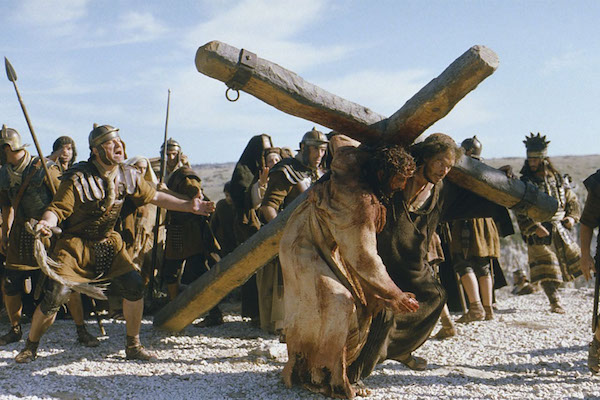LENT 2024: Day 30 - LIFE OF CHRIST

LENT 2024: DAY 30 - Tuesday March 19
“The procession of the Cross was usually preceded by a trumpeter to clear the road; then followed a herald announcing the name of the criminal who was being led to execution. Sometimes the name of the criminal and the reason for his condemnation was written on a board and hung about his neck. Two witnesses of the council which sentenced the one condemned to death were also to accompany the procession. A centurion mounted on horseback, along with a considerable detachment of soldiers, formed part of the procession… He bore the full weight of the Cross on His back and shoulders which were already raw from the scourging.
The Sunday previous He was hailed as “King” that morning the people shouted: “No King but Caesar.” The Jerusalem that saluted Him was now the Jerusalem that disowned Him. Since the temple priests had found Him accursed, they exiled Him from Jerusalem. This was the Law of Leviticus that the sin offering should be driven outside the city gates or the camp. “As for the transgression-victims, the bullock and the goat, whose blood was carried into the sanctuary to make expiation there, the carcasses must be taken away from the camp and destroyed by fire…” (Leviticus 16:27) Christ, the ultimate in sin offering, is driven like the scapegoat outside the city… “Thus it was that Jesus, when He would sanctify the people through His own blood, suffered beyond the city gate.” (Hebrews 13:12)
Fearful that the long scourging, the loss of blood, the crowning with thorns would bring His end before the Crucifixion, His enemies compelled a stranger, Simon of Cyrene, to help Him carry His Cross. Cyrene was a town on the northern coast of Africa. But Simon’s nationality is uncertain. He could have been Jewish, judging by his name, or a Gentile; it may be that he was even a black African, judging by his native locality… It was the first time the Savior laid His Cross on anyone; to Simon belongs the privilege of first sharig the Cross of Christ. “They forced a passer-by who was coming in from the country to carry it, one Simon of Cyrene, the father of Alexander and Rufus.” (Mark 15:21) [who were later] mentioned by the Apostle Paul as pillars of the Church.
Our Lord during His public life taught gentleness in return for injury: “If a man compels thee to attend him on a mile’s journey, go two miles with him of thy own accord.” (Matthew 5:41) Simon may never have heard the words; but words were not needed when he followed the Word.
Along the procession route, too, were many women. There are numerous instances of men failing in the Crucifixion, such as the Apostles who slept in the garden, Judas who betrayed, the Jewish and the Gentile courts who condemned, but there is not a record of a single woman ever asking for His death. A heathen woman had interceded for His life with Pilate. At the Cross there would be… women but only one Apostle. During His last week the children shouted “Hosanna”, the men cried “Crucify”, but the women “wept”. To the weeping women He said: “It is not for Me that you should weep, daughters of Jerusalem; you should weep for yourselves and your children.” (Luke 23:28)
This was the first time since His interrogation before Pilate that Our Lord broke His silence. It was the Passion sermon of the Savior, or rather the first part of it; the second part consisted of His Seven Last Words from the Cross… He Who wept at Bethany and Whose Blood now wept on the road of Jerusalem, bade them not to weep for Him, for His death was a willed necessity – willed freely by Him, but a necessity for men… No superficial wailings of the women of Jerusalem would weaken Him in His determined purpose of sacrifice… Because He was a Priest going to sacrifice, then let them weep only if they availed themselves not of its fruits. As He would purge death of death by rising from the grave, so He now purged tears of lamentation, by showing that sin alone was worth tears. They were weeping for Him as a good man, but no such tears would He have at His deathbed, By rejecting their grief, He showed that He was not a good man sent to death, but a God-man saving sinners.
On this as on many other occasions He bade His hearers look to the state of their own souls. He diverted attention from Himself Who was sinless, to those who needed Redemption… The women were told not to have misplaced sorrow; let them look to their soul, their children, their city. He needed no tears; they did.”

(Chapter 48, pgs. 776 – 784)
+ QUOTES FOR LIFE